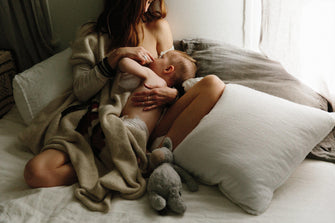Real Talk: How Nursing Affects Your Breasts

In part two of our four-part series on pregnancy and nursing, we’ve got the lowdown on the changes that happen while you’re breastfeeding.
Motherhood can best be described by a single David Bowie lyric: Ch-ch-ch-changes. From getting acquainted with your new little one, your new routines, and your new figure (just to name a few), there’s quite a bit of unfamiliar territory.
Of all those novel experiences, nursing your baby is no exception—especially since you and she are both learning the ropes at the same time. In those tender moments of feeding your little one, it helps to know what’s going on with your breasts so as not to be distracted with a freakout about leaking nipples or let-down sensation.
While not every woman will experience all of these shifts while breastfeeding, here are some of the most common breast changes to expect:
1. Size Increase
If you thought your breasts got larger while you were pregnant, that was just the beginning. When your milk comes in a few days after giving birth, it can feel like your breasts practically double in size overnight, and you may experience some breast pain with breastfeeding. Your body is making a whole lot of breastmilk at first, but as it adapts to how much your baby eats, your breasts will start to feel less full after 6-12 weeks. A good, supportive nursing bra can really help—just be sure to get one large enough for your new size. Your breasts after breastfeeding will also change and be a different size, and many women may feel that their breasts have relaxed. To ensure that your breasts are supported during pregnancy and nursing, and to prevent sagging from breastfeeding, ensure that you have a comfortable bra that fits and supports you throughout the process.
2. Tenderness and sore breasts
Similar to the soreness you experienced early on in pregnancy, breast tenderness comes from your milk ducts being full and increased blood flow to your breasts. The good news is that it usually only lasts for a little while—the tenderness often decreases after a few days.

3. Sore nipples
For some women, the early stages of breastfeeding can be rough on the nipples. Soreness can typically be relieved by adjusting baby’s latch, while chafing or cracked skin can often be soothed with nipple balm. In addition to breastfeeding, it’s also possible to get sore nipples from pumping. It’s important, however, to talk to your doctor or a lactation consultant if you have any major concerns.
4. Let-down sensation
You may notice a newfound tingling sensation in your breasts when you start to nurse, especially in the first few weeks. That’s called let-down, the process of your breasts squeezing milk into your milk ducts to help your baby nurse.
5. Leaking breast milk
Now that you’re actively lactating, your breasts may leak or drip breast milk occasionally. This can happen somewhat unexpectedly (how fun!), but many women experience it when they hear their baby cry or on the opposite breast while nursing. Nursing pads help keep leaks under control, so have a few of them handy.
Although nursing can feel like a big fumbling mess at first, after a few weeks, you and your baby will both have the hang of it, and it’ll become second nature. Motherhood is an inexplicably special and wild ride, so our goal is for our Nursing Bra to make breastfeeding, pumping, and all the ch-ch-ch-changes a little bit easier.
Additional reporting by Cathy Bishop.
Tags: